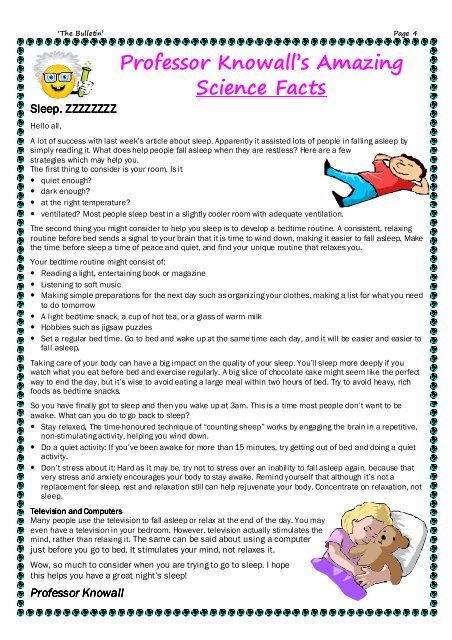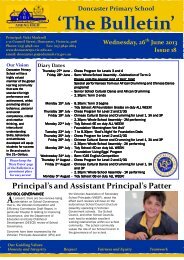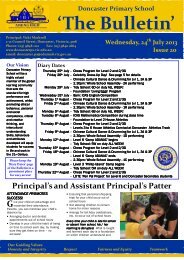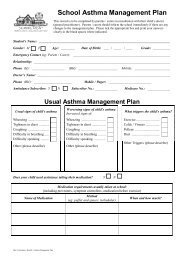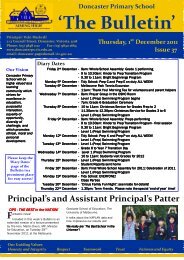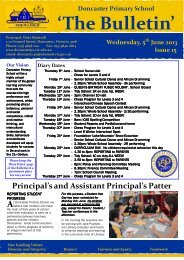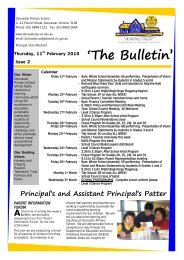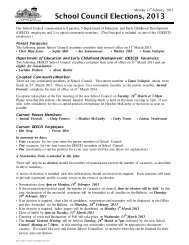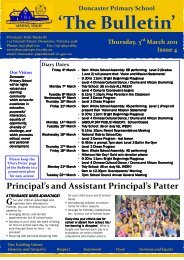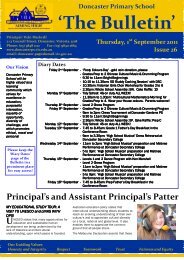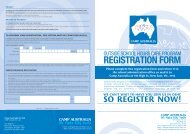2010 Newsletter 26 - Doncaster Primary School
2010 Newsletter 26 - Doncaster Primary School
2010 Newsletter 26 - Doncaster Primary School
Create successful ePaper yourself
Turn your PDF publications into a flip-book with our unique Google optimized e-Paper software.
‘The Bulletin’ Page 4<br />
Sleep. ZZZZZZZZ<br />
Hello all,<br />
Professor Knowall’s Amazing<br />
Science Facts<br />
A lot of success with last week’s article about sleep. Apparently it assisted lots of people in falling asleep by<br />
simply reading it. What does help people fall asleep when they are restless? Here are a few<br />
strategies which may help you.<br />
The first thing to consider is your room. Is it<br />
• quiet enough?<br />
• dark enough?<br />
• at the right temperature?<br />
• ventilated? Most people sleep best in a slightly cooler room with adequate ventilation.<br />
The second thing you might consider to help you sleep is to develop a bedtime routine. A consistent, relaxing<br />
routine before bed sends a signal to your brain that it is time to wind down, making it easier to fall asleep. Make<br />
the time before sleep a time of peace and quiet, and find your unique routine that relaxes you.<br />
Your bedtime routine might consist of:<br />
• Reading a light, entertaining book or magazine<br />
• Listening to soft music<br />
• Making simple preparations for the next day such as organizing your clothes, making a list for what you need<br />
to do tomorrow<br />
• A light bedtime snack, a cup of hot tea, or a glass of warm milk<br />
• Hobbies such as jigsaw puzzles<br />
• Set a regular bed time. Go to bed and wake up at the same time each day, and it will be easier and easier to<br />
fall asleep.<br />
Taking care of your body can have a big impact on the quality of your sleep. You’ll sleep more deeply if you<br />
watch what you eat before bed and exercise regularly. A big slice of chocolate cake might seem like the perfect<br />
way to end the day, but it’s wise to avoid eating a large meal within two hours of bed. Try to avoid heavy, rich<br />
foods as bedtime snacks.<br />
So you have finally got to sleep and then you wake up at 3am. This is a time most people don’t want to be<br />
awake. What can you do to go back to sleep?<br />
• Stay relaxed. The time-honoured technique of “counting sheep” works by engaging the brain in a repetitive,<br />
non-stimulating activity, helping you wind down.<br />
• Do a quiet activity: If you’ve been awake for more than 15 minutes, try getting out of bed and doing a quiet<br />
activity.<br />
• Don’t stress about it: Hard as it may be, try not to stress over an inability to fall asleep again, because that<br />
very stress and anxiety encourages your body to stay awake. Remind yourself that although it’s not a<br />
replacement for sleep, rest and relaxation still can help rejuvenate your body. Concentrate on relaxation, not<br />
sleep.<br />
Television and Computers<br />
Many people use the television to fall asleep or relax at the end of the day. You may<br />
even have a television in your bedroom. However, television actually stimulates the<br />
mind, rather than relaxing it. The same can be said about using a computer<br />
just before you go to bed. It stimulates your mind, not relaxes it.<br />
Wow, so much to consider when you are trying to go to sleep. I hope<br />
this helps you have a great night’s sleep!<br />
Professor Knowall


